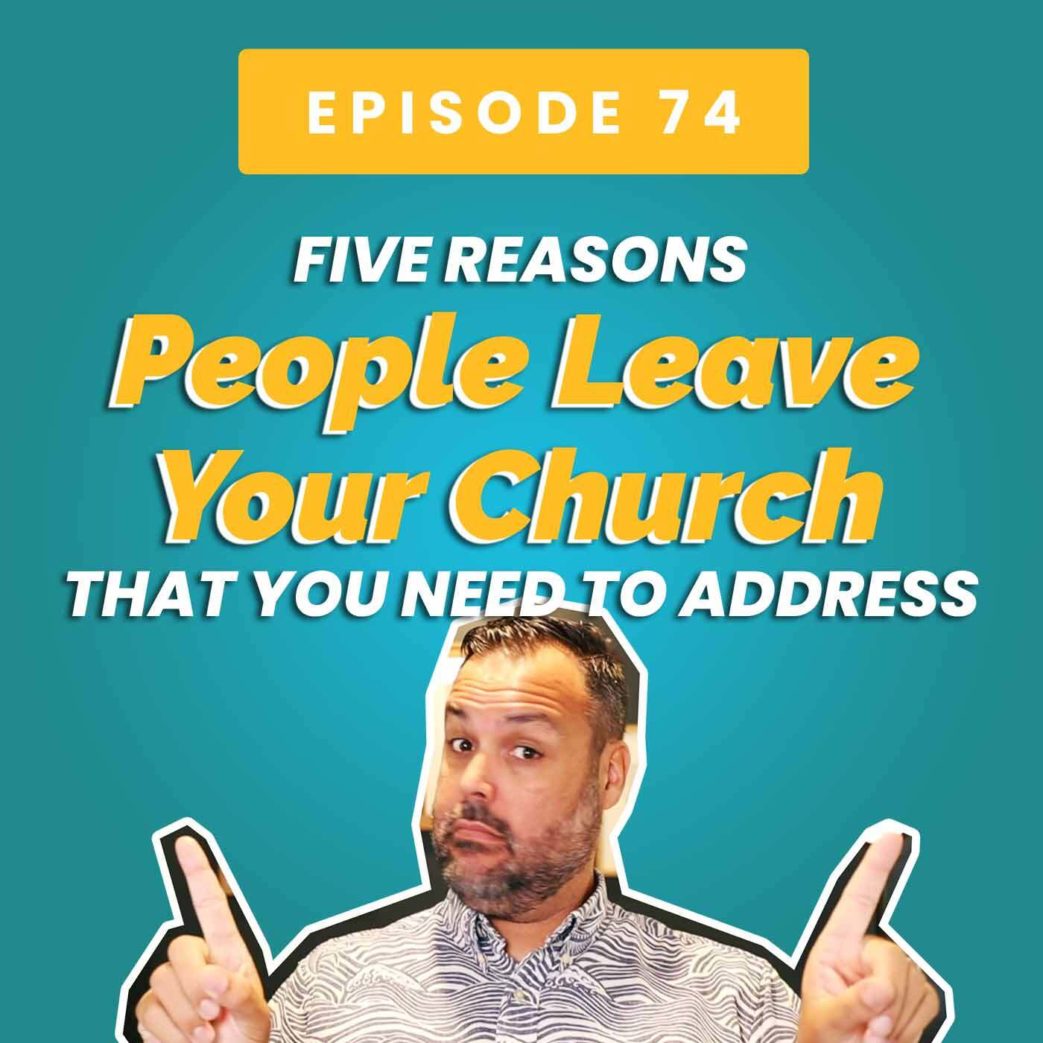One sad reality for church leaders is that from time to time, people will leave. Nobody likes that part of ministry. And often, the reasons people leave your church are out of your control.
People move, have different theological convictions, or get married to someone who is part of another church. There’s not much you can do about that.
But there are some reasons why people leave the church that you need to address.
Think through some of these reasons and ask yourself what your church can do to help more people stay connected.
Estimated reading time: 10 minutes
Table of contents
- 1. They Got Out of The Habit
- 2. No Clear Next Steps
- 3. Never Found Their People
- 4. Becoming Too Political
- 5. Connection To A Particular Staff Member
- 6. Generational and Demographic Shifts
- 7. Thoughts, Feelings, and Behaviors
- 8. Institution and Organization
- Reasons People Leave the Church
- Further Resources for Church Leadership
1. They Got Out of The Habit

The Problem
Over the pandemic period, many churches had to close their doors for a time. Some churches are still not meeting in person. It’s getting rarer and rarer for someone to attend church weekly.
According to ChurchTrac, there was a dramatic drop in attendance in church during and after the pandemic.

As a result, many members got out of the habit of attending local church regularly.
And as we all know, the more people miss church, the easier it is to miss church.
The Solution
Consider ways to reach out to people who haven’t been attending church for a while. Create a well-thought-out process to engage those people.
We recorded another episode on this topic: How To Build The Perfect Church Visitor Follow-Up Process
2. No Clear Next Steps
The Problem
Sometimes when people leave your church, it’s because they never really became a part of the church in the first place.
We think they were committed, but in their minds, they were never really bought in.
The Solution
The fix is to ensure your church has a detailed next steps process that will help take people from visitors to fully committed members.
Once you have the process outlined, be sure to execute it. A plan that never actually happens doesn’t help anyone.
3. Never Found Their People
The Problem
Personal relationships are the glue in churches. If people lack these connections, they will not stick at your church for very long.
For someone to be a part of your church family for any time, they need to have friends.
This can’t be relationships that only exist on Sunday morning.
The Solution
For most churches, the solution is small groups. These groups need to be based on more than just bible teaching and prayer. They need to be places where real life is lived out. This is where real relationships are forged.
4. Becoming Too Political

The Problem
In today’s climate, there is a constant push to turn our churches into places of political activism.
In many cases, your members will ask you to be more political. Our advice: Do the opposite.
The Solution
You need to understand that your church is full of people who believe differently from you about politics. In today’s charged atmosphere, political disagreement often drives people out of their faith community.
This isn’t to say you can’t have your own political opinions. You can. The question you need to answer is whether sharing your politics in the church will help reach more people with the Good News of Jesus. The Catholic church actually does this really well, keeping politics out of the tradition of church service.
5. Connection To A Particular Staff Member
The Problem
One of the most common reasons people leave their local church is because a staff member has left. Often people feel a connection with church leaders like a Pastor, Worship Leader, or Assisting Minister.
It is essential to make sure that your church is more than a particular connection personality.
People on your team will come and go. Often this happens for good reasons, like a new ministry assignment.
The Solution
If you teach that your Christian church is about more than one person, you can help mitigate some of the loss from those transitions.
6. Generational and Demographic Shifts

As we delve into the confusing landscape of faith and community, it’s impossible to ignore the seismic shifts rippling through different age groups and cultural backgrounds. The interplay of generational dynamics has become a central force in the ebb and flow of church engagement.
The Problem
On one hand, we witness the seasoned traditions and steadfast values upheld by the older Christians, marking a legacy of unwavering commitment. On the other, young people, raised in an era of unparalleled connectivity and diverse cultural influences, are reshaping the very fabric of religious identity.
It’s undeniable that the religious narrative is evolving, woven with the threads of globalization and an increasingly interconnected world.
As church leaders grapple with the challenges of catering to a diverse and multigenerational flock, the question arises: how can the church bridge the gap between tradition and the evolving needs of most young Christians without compromising its core values?
This dynamic shift not only poses a challenge but also presents an opportunity for the church to embrace inclusivity and adaptability, fostering a space that resonates with the values and aspirations of all generations.
The Solution
By acknowledging these generational nuances and addressing them with sensitivity and foresight, the church can pave a path toward a more unified and resilient community of faith.
7. Thoughts, Feelings, and Behaviors

When it comes to talking about why some folks decide to leave the church, it’s more than just a simple case of “I don’t agree with this doctrine anymore.” There’s a whole emotional rollercoaster and personal journey going on underneath the surface.
Let’s unpack this a bit.
The Problem
Picture this: you’re sitting in those wooden pews, surrounded by familiar faces and hymns you’ve known since you were a kid. But inside, there might be this nagging feeling of not really fitting in, a struggle to figure out where you belong. It’s like an identity crisis in the midst of all the prayers and sermons.
You’re not the only one feeling this way. Many people in the church grapple with questions about who they are and where they stand, trying to find a space where they feel truly accepted and understood.
And then, there’s the whole issue of connections. We all crave genuine relationships, right? We want to feel like we belong somewhere, that we have a community that’s got our back. But if that sense of connection isn’t there, or if it feels superficial, it can leave you feeling pretty empty.
Sometimes, it’s those moments of shared vulnerability and understanding that really make a place feel like home. Without that, it’s easy to feel like you’re just going through the motions, and that’s not what anyone wants.
But here’s the kicker: what happens when things go south within the church community? Maybe there’s some conflict, or someone feels let down or judged. Suddenly, that safe space doesn’t feel so safe anymore. It’s like a trust fall gone wrong. When negative experiences overshadow the positive ones, it can really take a toll. Feeling disconnected and disillusioned can be a major reason why people decide to step away.
The Solution
So, how can the church tackle these issues? Well, it’s all about building a community that’s rooted in empathy and understanding. Creating an environment where people can openly talk about their struggles without fear of judgment can make a world of difference.
It’s about fostering a culture of genuine care and support, where everyone’s voice is not just heard but also valued. It’s like laying the foundation for a place where people don’t just show up for the rituals, but for the real, raw connections that make life a little bit easier to navigate.
In the end, the church isn’t just a building or a set of beliefs; it’s a community, a family of sorts. And just like in any family, there’s a need for open communication, understanding, and a whole lot of love.
It’s about creating a space where people can truly be themselves, without the fear of being cast out or judged. When the church becomes that kind of place, where hearts are open and understanding is abundant, it’s hard for anyone to feel like they don’t belong.
8. Institution and Organization

Alright, let’s dive into the nitty-gritty of how the church operates behind the scenes. You know, the ins and outs that can make or break the whole experience for folks. So, buckle up!
The Problem
First off, we’ve got to talk about the big shots—the church leadership. They’re the ones steering the ship, making all the big decisions. When these leaders are transparent and approachable, it’s like a breath of fresh air.
But when things get a bit shady or there’s a lack of communication, that’s when the trouble starts. People want to trust their leaders, to feel like they’re being led by someone who’s got their best interests at heart. Without that trust, it’s easy for the whole system to feel a bit wobbly.
Then there’s the whole deal with accountability. When the church is open about its finances and how things are run, it’s like a vote of confidence. But when there’s a lack of transparency, people start to question where their hard-earned donations are really going.
That’s when the trust can really take a hit. A little honesty can go a long way in keeping the faith alive, you know?
Now, let’s talk about the vibe within the church community. Inclusivity is the name of the game. When everyone feels welcome, no matter their background or beliefs, it’s like the church becomes this big, warm hug.
But if there’s a hint of exclusivity or favoritism, it’s like building invisible walls that keep some people out. Creating a space where everyone feels like they belong, where diversity is celebrated, can really be a game-changer.
But here’s the thing: it’s not just about the leadership or the community vibe; it’s about how the church engages with the outside world too. When the church is actively involved in making a positive impact in the wider community, it’s like a beacon of hope.
But when it’s all about staying in the comfort zone, it can give off this vibe of being disconnected from reality. Getting out there and making a real difference, being a force for good, that’s what makes a church feel relevant and alive.
The Solution
So, how can the church work on these factors? Well, it’s all about creating a culture of openness, honesty, and genuine care. Leaders need to be approachable, and the inner workings of the church should be as transparent as possible.
Embracing diversity and actively engaging with the community can help the church stay rooted in the real world, making a tangible impact where it’s needed most. When the church becomes a place that’s not just about rituals but about real, meaningful connections and making the world a better place, that’s when the magic happens.
Reasons People Leave the Church

So, there you have it! Navigating the reasons of why people leave the church isn’t a one-size-fits-all deal. It’s about understanding the personal struggles, the need for genuine connections, and the importance of feeling heard and valued.
By creating a church environment that’s all about inclusivity, transparency, and genuine care, we can build a community where everyone feels like they truly belong. It’s not just about the rituals; it’s about fostering a place where real, heartfelt connections thrive. After all, isn’t that what it’s all about?
Further Resources for Church Leadership






Comments 6
This article was very encouraging to me because we at Tabernacle of Praise are a community where you can just be yourself
Thanks for the enlightenment. Besides the other reasons, that point of ‘they never were connected to the church’ has helped me a lot. i used to wonder how one can just leave after quite a long time and they do not seem to have any regrets about it.
Author
So glad it helped. It always hurts when people leave.
Yes, of course, it is true. I have experienced such habits . May God continue to give you more wisdom.
Thank you so much, we appreciate you!
Good stuff!